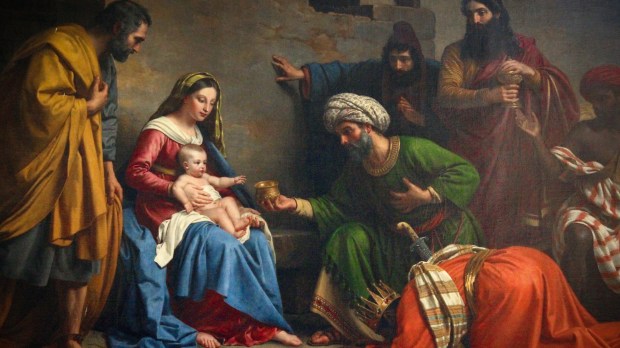After spending, singing and celebrating for a month and a half, all of us neck-deep in “Jingle Bells,” parodies of “Jingle Bells,” radio jingles with bells and plain old jingling bells until we’re all so cock-eyed and half-crazy we can barely stand the sight of a wreath, let alone a crèche — the twelve days of Christmas are finally here.
But who may abide the day of its coming?
Whenever I sense Advent being razed and Christmas being flattened (two things that tend to go hand in hand), I turn to Handel’s Messiah, especially
for the documentary Messiah. While other versions lumber along politely, there’s something energetic, frenetic and even about Minkowski’s take on the oratorio. It makes an 18th century summary of the whole Christian story go toe-to-toe with the pace and passion of the digital age.But this performance of Messiah also turns my mind back to the soul of Christmas: its carnality.
In the Messiah film, verses about the anticipation and arrival of Christ are sung for (and by) a slew of unsavory characters: out-of-tune prisoners (clip above),
, , , and everyday outcasts of all stripes. On the face of it, none of this exactly screams “Christmas spirit.” It leaves our Charles Dickens and Norman Rockwell fantasies about what Christmas should be — the pristine and well-timed light shows, the crackling fires, the well-dressed carolers — out in the cold. This isn’t to say that all of those trappings of Christmas aren’t important; it’s just that they’re forced to wait their turn.Minkowski’s Messiah hits on something more elemental and indispensable: that Christmas “spirit” first expressed itself in and through the confused, mundane world. This is more than just a theological emphasis on how Christ came to save human beings from sin; and it’s more than just a social emphasis that, as Bonhoeffer put it, “God is with the lowly”; it’s a metaphysical emphasis that God becomes incarnate, literally with the clay of his creation. The Prince of Peace becomes one with our dysfunctional human family, just as he is one with the Everlasting Father (as
reminds us). Christ is consubstantial — so Christ’s Mass is carnal.Glowing Nativity scenes everywhere convey Christ’s divinity and the holiness of his human parents with a single, placid image, but
takes us a step closer to the human reality of the situation, which we can also never forget: an exhausted man and woman with a crying newborn in a cavernous space where animals eat and excrete in some dark corner of Palestine. This doesn’t diminish its power; it is its power. For fathers worried about having it all together before they have children, or mothers confronted with the blood, sweat and tears of the delivery room, it carries a message: God has paved the way before them in just such a family.The same is true of every person, whatever idiosyncrasy or frailty they carry or whatever difficulty or horror they face. The happy news of Christmas is not a spiritual idea or program, a lovely but cold and distant star. It’s a union of the sacred and the profane, a reality that touches our flesh, here and now.
“Behold, a virgin shall conceive and bear a son,” Isaiah sings, “and shall call his name Emmanuel: God with us.”
Matthew Becklo is a husband and father, amateur philosopher and cultural commentator at AleteiaandWord on Fire. His writing has been featured in First Things, The Dish and Real Clear Religion.

